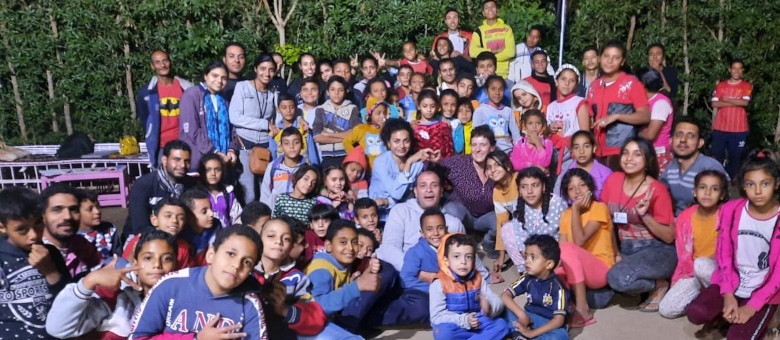Respect for People in Poverty

Above: Ms. Gold and Hélène Rozet (together at center) Rezighat, Louxor, Egypt, 2021 © ATD Fourth World
Hélène Rozet, ATD Volunteer Corps member, wrote this piece for an event in February called Journée de la Fraternité Humaine. The event was organised by GAIC, a group that promotes friendship between Muslims and Christians.
Taking a stand
Joseph Wresinski, who founded ATD Fourth World, spent his entire childhood in poverty. Then he became a priest. In 1956, his bishop suggested he go work in a shantytown [of approximately 250 families] just outside Paris. For Wresinski, it was a shock to find himself face to face once more with what he and his family had endured many years ago.
Yet he decided to stay among these families living in incredible deprivation in order to take a stand alongside them. Wresinski encouraged others from different social classes, and with a variety of convictions and faiths, to join him. Together they founded ATD Fourth World with the goal of eradicating poverty. This, they understood, meant ensuring respect for everyone’s rights and dignity, with no exceptions. Today, ATD Fourth World—All Together in Dignity—works in 35 countries around the world.
In Haiti
As a full-time Volunteer Corps member, I spent more than eight years with a small ATD team in Haiti. There, we worked closely with residents in the worst off neighbourhoods of the capital city, Port-au-Prince. With these residents and Haitian friends from other backgrounds, we led education and health related activities. During this time, we witnessed situations of absolute chaos, lives broken and destroyed, yet endlessly begun again. We saw humiliation, but also courage as well as tremendous mutual support and humanity.
Values shared across many faiths
A few years later, I went to Egypt to start ATD Fourth World’s first activities in the Middle East. I lived there for five years, leading Tapori Children’s Network initiatives that promote friendship between children. Our team created deep connections between Muslims and Christians. Some were making a good living, but others came from very underprivileged areas. I remember one woman who sold handkerchiefs on the sidewalk. Through this work, I met so many people committed to overcoming extreme poverty and to supporting rights and dignity for everyone. These things were absolutely universal, a common factor shared by all faiths.
“It is incredibly hard”
I now live in the Paris region of France. One of my goals is to get to know immigrants experiencing great hardships. So I’ve gotten involved with Utopia 56. Every night, this group organises a meeting point by the Paris town hall for families, single women, and children who don’t have housing.
Ordinary citizens offer a room for the night and volunteers bring people to these homes where they get a warm welcome and a place to sleep. Parishes and other institutions offer housing alternatives too.
- When we run out of housing options, we take these women, families, and young people to a place where they can stay the night. Sometimes it’s in a tent or a park, or underneath a bridge. Of course, it is incredibly hard.
Seen as criminals, treated like dogs
Currently, I’m with the part of Utopia 56 that works with single men. In Paris and the surrounding region, many live on the streets. We go out to meet them and offer help with administrative procedures. Or we show them where they can find services. Sometimes we just have a chat together.
The day before yesterday, when I went out with three young women, we met about twenty Sudanese men sleeping under a bridge. They had only a few mattresses and blankets. Most have residence permits but can’t find housing. Some have been in France for a few days, others for a few months or even a few years.
- Every night between 3 and 5 AM, the police wake them up, often roughly, and disperse them.
One of these Sudanese men is missing a foot. He walks with crutches and has many other serious health problems. Through another organisation, we managed to find him housing and health care. But how many more are there–in Calais, Paris, and so many places in France–who continue to be chased off? These men say,
- “They look at us like we’re criminals, and they treat us like dogs.”
Beyond bitterness, changing the world
At Utopia 56, Cimade, ATD Fourth World, and so many other organisations, we struggle for respect of rights: housing, justice, health, education, and other fundamental rights. We are fighting for everyone: families who have always been in France, those who came to this country two or three generations ago, residents of downtrodden neighbourhoods, and, of course, the exiled people whose paths here are often complex and turbulent.
Through connections with those deprived of their rights, we see so much humanity as people support one another. We hear their desire to help build a true community of cooperation. I wanted to share this with you through a sort of prayer, words Joseph Wresinski said in 1980 during the “Fourth World Brotherhood Rally for Immigrants”.
- “Because of our suffering and our hope, we want the world to move forward. Those who are changing the world are people like us who have moved past bitterness and found hope in brotherhood. And it is because we put our hope in brotherhood that the future of humanity is in our hands.”

